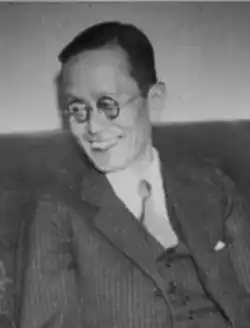Akira Ariyoshi
Akira Ariyoshi | |
|---|---|
有吉明 | |
 | |
| Ambassador Extraordinary and Plenipotentiary to the Republic of China | |
| In office May 1935 – March 6, 1936 | |
| Special and Plenipotentiary Minister to the Republic of China | |
| In office July 1932 – May 1935 | |
| Ambassador Extraordinary and Plenipotentiary to Brazil | |
| In office November 1926 – July 1930 | |
| Head Delegate to the League of Nations for Japan | |
| In office 2nd Session – 4th Session | |
| Special and Foreign Minister to Switzerland | |
| In office April 1920 – November 1926 | |
| Consul General to Shanghai International Settlement | |
| In office November 1909 – September 1919 | |
| Second Secretary of the Embassy in France | |
| In office April 1908 – November 1909 | |
| Consular officer in Busan | |
| In office February 1904 – April 1908 | |
| Personal details | |
| Born | April 15, 1876 Miyazu, Kyoto, Kyoto Prefecture |
| Died | June 25, 1937 |
| Resting place | Yanaka Cemetery |
| Relations |
|
| Education | Kyoto Prefectural Commercial School |
| Alma mater | Tokyo Higher School of Commerce |
| Awards | |
| Alternate place of birth | Tokyo |
Akira Ariyoshi was a Japanese diplomat during the Shōwa era.[1][2] He was the first ever diplomat from Japan to China to hold the rank of Ambassador Plenipotentiary.[1] He is one of the foundational figures of the League of Nations, being assigned as Japan's Head Delegate to its 2nd session.[3] He was Japan's representative at many committees of the League, including being present for the creation of the Opium Advisory Committee (OAC).[4] During his time spent as the Japanese plenipotentiary in Brazil, Ariyoshi argued fervently against expansion into the Amazon rainforest, which he considered a sacred place, and advocated for a policy of what he called concretization: building where you already exist.[2] Aryioshi also came into a contentious relationship with the Kaigai Kogyo Kaisha (Overseas Emigration Institute), the Japanese organization dedicated to Japanese settlements in Brazil, informing the Brazilian government and his own that this type of mass settlement would create great anti-Japanese sentiments in Brazilian society.[5] While in China, Ariyoshi preferred soft power over military action, forming a friendship with the General Zhang Xueliang and other Chinese Generals sympathetic to the Japanese, but Ariyosha also served here at the pleasure of Minister Hirosi Saito, which was a complex and contentious relationship.[6][7] He he had also formed friendships with Chiang Kai-shek and Wang Jingwei. Especially in the years leading up to the Second Sino-Japanese War, Ariyoshi was opposed Japanese military action in China, and retired in 1936 out of protest.[8] However, he died less than a year later.[9]
See also
- Paek Chŏnggi, the leader of an attempted assassination targeting Ariyoshi
References
- ^ a b 日本人名大辞典+Plus,367日誕生日大事典, 20世紀日本人名事典,デジタル版. "有吉明(アリヨシ アキラ)とは? 意味や使い方". コトバンク (in Japanese). Retrieved 2025-08-02.
{{cite web}}: CS1 maint: multiple names: authors list (link) CS1 maint: numeric names: authors list (link) - ^ a b "有吉 明(ありよし・あきら)". サンパウロ人文科学研究所. Retrieved 2025-08-02.
- ^ O’Connor, P. (2010-01-01), "2. The Foreign Ministry Network, 1904–1937", The English-language Press Networks of East Asia, 1918-1945, Brill, pp. 55–91, ISBN 978-90-04-21290-9, retrieved 2025-08-02
- ^ "Historical Documents - Office of the Historian". history.state.gov. Archived from the original on 2025-03-06. Retrieved 2025-08-02.
- ^ "Reflections: Editorial Opinion on the Pacific". Pacific Affairs. 2 (5): 286. 1929. ISSN 0030-851X.
- ^ TIME (1935-05-20). "Foreign News: Carp". TIME. Retrieved 2025-08-02.
- ^ Dennett, Tyler (1932). "China's Breakdown Baffles Powers". Current History (1916-1940). 37 (3): 379–382. ISSN 2641-080X.
- ^ Hattori, Ryuji (2025), Hattori, Ryuji (ed.), "Straying from the Ideals of China Policy—Foreign Minister and Harmony Diplomacy", War and Diplomacy in Modern Japan: Prime Minister Kōki Hirota and His Times, Singapore: Springer Nature, pp. 43–75, doi:10.1007/978-981-96-5310-2_4, ISBN 978-981-96-5310-2, retrieved 2025-08-02
- ^ "有吉明 (8th Edition) - JINJIKOSHINROKU (who's who) Database". jahis.law.nagoya-u.ac.jp. Retrieved 2025-08-02.